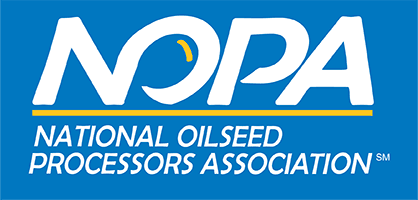National Oilseed Processors Association Announces 2025 Policy Priorities
Renewable Fuels, Tax Incentives and Seed Oils Top of Mind for Oilseed Processors
WASHINGTON, February 13, 2025 – Today, the National Oilseed Processors Association (NOPA), the trade association representing the U.S. soybean, canola, flaxseed, safflower seed, and sunflower seed crushing industries, announced five key policy priorities driving the organization’s policy agenda in 2025.
“NOPA is advocating for policies that support American farmers, incentivize continued growth of U.S.-grown biofuels, provide American jobs and reduce inflation to benefit the U.S. economy,” said Devin Mogler, NOPA President and CEO. “As the 119th Congress and the Trump administration begin to tackle these critical issues, NOPA is well-positioned to make a difference for oilseed processors and stands ready to work with our industry partners and policymakers in Washington, D.C. and beyond to support our shared goals.”
NOPA will be advocating for the following policies in 2025:
- Achieving Renewable Fuel Standard (RFS) volumes that accurately reflect expanding industry capacity
- The Environmental Protection Agency (EPA) can increase the Renewable Volume Obligations (RVOs) for 2026 and beyond to reflect expanding oilseed processing and advanced biofuel production capacity while accounting for the impact of potential Small Refinery Exemptions (SREs).
- The domestic oilseed processing industry has invested over $6 billion to expand processing capacity by over 30% to meet continued demand growth from its food, feed and fuel customers. The oilseed and advanced biofuels industries are ready and able to meet dramatically higher RVOs.
- Securing biofuel tax credits that put U.S. farmers and U.S. processors first.
- To ensure the future of U.S. energy independence, the 45Z Clean Fuel Production Tax Credit should give preference to feedstocks grown in the United States and provide a level playing field for soybean oil and canola oil relative to other feedstocks.
- The U.S. oil and gas industry and soybean value chain support nearly 12 million jobs and contribute hundreds of billions of dollars to the U.S. economy. Future energy, job and economic security rest on sound and predictable tax policy. Certainty and fairness can spur continued investment, growth and U.S. energy dominance.
- Slowing the flood of imported feedstocks to support U.S. competitiveness and advance domestic production.
- From January 2022 through December 2024, the U.S. imported over 14 billion pounds of “Used Cooking Oil” (UCO) and tallow for biofuel use, nearly triple the 5.3 billion pounds imported over the prior 20 years combined, putting American-grown crops at a disadvantage and further damaging an already struggling farm economy. The Trump administration can use its regulatory authority to limit the flood of imported UCO and tallow.
- The Trump administration can support American farmers by enacting policies to prioritize the use of U.S.-grown crops for producing advanced biofuels including biodiesel, renewable diesel and sustainable aviation fuel (SAF).
- Continued advocacy for food security and healthy, balanced and affordable diets supported through vegetable-based protein and oils.
- Soybean processing investments are boosting domestic capacity to increase the availability of high-protein soybean meal – a critical feedstuff for animal protein as part of a balanced diet. Increased production of protein meal helps mitigate inflation faced by Americans at the grocery store.
- Increasing soybean meal production also enhances U.S. competitiveness in growing overseas markets and enables improved food security in emerging markets.
- Seed oils, including soybean oil, are a source of essential fatty acids and key nutrients that promote heart health, reduce inflammation and contribute to a healthy and balanced diet. Numerous respected health organizations have recognized and endorsed the nutritional benefits of seed oils as part of a balanced diet.
- Science and risk-based food policy that does not discriminate against ingredients that have long been a cornerstone of modern nutrition is essential for ensuring a healthy America.
- Incorporating new research into federal and state clean fuel programs.
- Agricultural feedstocks are the backbone for sustainable biofuel production, and clean fuel programs must recognize the lower carbon intensity of soybean oil. Misguided efforts to limit vegetable oil eligibility in clean fuel programs, such as California’s Low Carbon Fuel Standard, restrict industry choice and put the U.S. farm economy at a disadvantage.
- Sustainability requirements should adopt a targeted, risk-based approach that incorporates the most recent data.NOPA’s Life Cycle Inventory Data of U.S. Soybean Processing captured a 38% reduction in soybean processing emissions under the 2023 GREET model, demonstrating the significant progress by the U.S. soybean industry toward decreasing the industry’s carbon footprint.
Read More: NOPA’s 2025 Policy Priorities
###
Organized in 1930, the National Oilseed Processors Association (NOPA) represents the U.S. soybean, canola, flaxseed, safflower seed, and sunflower seed-crushing industries. NOPA’s membership is engaged in the processing of oilseeds for meal and oil that are utilized in the manufacturing of food, feed, renewable fuels and industrial products. Our 18 members operate over 70 U.S. soybean and softseed solvent extraction plants across 21 states, crushing approximately 97% of all soybeans processed in the United States, the equivalent to more than 2 billion bushels annually. Learn more at NOPA.org.

